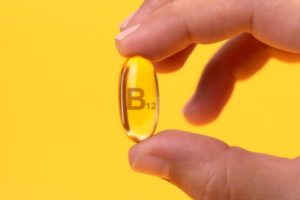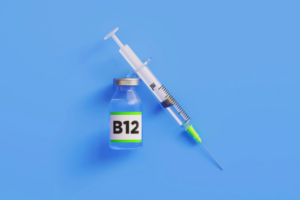
B12 Shots vs. Vitamins: What’s The Difference?
November 27, 2024
So, what is the difference when it comes to a B12 shot vs vitamins? The goal of this blog is to dive into the key differences between b12 shots and vitamins. Vitamin B12 is one of those essential nutrients that plays a very critical role in maintaining our overall health and well-being. Known as the “energy vitamin,” it supports vital functions such as energy production, the formation of red blood cells, and proper functioning of the nervous system. Yet, despite its importance, many people are found to be suffering from a deficiency of B12, leading to a range of health issues.
The two most common methods for replenishing B12 include oral B12 vitamins and B12 shots. Both aim to resolve deficiencies but work in different manners and at different levels of effectiveness.
In this blog, we’ll dive into the differences between these two approaches and discuss why B12 shots often emerge as the superior option for addressing deficiencies and promoting optimal health.
Why Is Vitamin B12 Important?
Vitamin B12 is a very important nutrient that plays a vital role in various functions in the body. It converts food into energy, assists in the formation of healthy red blood cells, and keeps the nervous system functioning well. Here’s a closer look at why this nutrient is so important:
Energy Production
B12 is at the center of converting carbohydrates into glucose, the primary fuel of the body. Without sufficient B12, energy production is considerably slowed, leading to symptoms of fatigue and lethargy.
Formation of Red Blood Cells
Vitamin B12 is required for the healthy production of red blood cells. Its deficiency may lead to fewer or abnormally formed red blood cells, conditions that could cause anemia, leading to tiredness and weakness.
Nervous System Support
B12 helps maintain the myelin sheath around the nerves, protecting them and thus ensuring communication between the brain and other body parts is smooth. In cases of deficiency, it causes damage to the nerves and can lead to tingling or even long-term neurological problems.
Symptoms of Vitamin B12 Deficiency
When B12 levels fall, the body sends out signals that something is not right. Common symptoms of a deficiency include:
- Ongoing fatigue and weakness.
- Memory problems or difficulty concentrating.
- Mood disturbances such as depression or irritability.
- Tingling or numbness in hands and feet.
These symptoms can range from mild to severe, depending on the extent of the deficiency.
Who Is at Risk of Vitamin B12 Deficiency? B12 Shot vs Vitamin
Because of dietary restriction or malabsorption, some groups are at a higher risk of developing
B12 deficiency. These include:
- Vegans and Vegetarians: As most sources of B12 are animal-based, individuals following plant-based diets are more vulnerable.
- Older Adults: Age-related changes in digestion can lead to reduced efficiency in the stomach’s ability to absorb B12.
- People with Malabsorption Conditions: Conditions such as Crohn’s disease, celiac disease, and pernicious anemia affect the absorption of B12.
- Individuals on certain medications: Those who have taken antacids for a very long period or people who take diabetes medications such as metformin.
Knowing these risks makes early and proper treatment of B12 deficiency quite significant, to which this blog will delve further.
What are B12 vitamins? How do they differ from b12 Shots?

B12 vitamins are convenient but may take longer to show results.
B12 vitamins are one of the most accessible ways to supplement Vitamin B12, which is usually used to cure or prevent deficiencies. These supplements come in two common forms:
- Cyanocobalamin: An artificial type of B12 that the human body first converts to an active form before utilization.
- Methylcobalamin: The most natural and better-absorbed form of B12.
Both forms are effective, but methylcobalamin is often preferred due to its better bioavailability.
How Oral B12 Supplements Work
The absorption of a B12 vitamin requires that it first goes through the process of digestion. The stomach produces intrinsic factor, which is a protein that binds to B12 and permits its absorption in the small intestine. However, this can vary greatly on an individual basis depending on things like digestive health, age, and medical conditions.
Oral B12 may prove seriously less effective for people who cannot absorb the nutrient well; the digestive system may not be able to process enough of the element.
Availability, Cost, and Convenience
Oral B12 vitamins are available over the counter, hence easily accessible to most people. They are also fairly cheap compared to other methods of supplementing B12. However, supplements taken daily demand consistency, and results might take time to show, especially in those with a severe deficiency. In cases of malabsorption, oral supplements will not help the patient much.
What are B12 shots?
B12 shots are a form of Vitamin B12 given by injection-usually intramuscularly-so the nutrient bypasses the digestion process altogether. It is due to this direct delivery that B12 shots can be particularly effective for people with problems of absorption or severe deficiencies.
How B12 Shots Work
Unlike oral supplements, B12 shots are injected right into the bloodstream. This way, it avoids the digestive route and thus ensures that the body absorbs almost 100% of the Vitamin B12. This is especially great for people who suffer from conditions such as pernicious anemia or gastrointestinal disorders, where the absorption from food or oral supplements is not possible.
B12 injections are a surefire method of increasing B12 levels and can, within days, greatly improve symptoms associated with fatigue, weakness, and disturbances in mood.
Administration Process
These B12 injections may be administered intramuscularly either in the arm or the thigh. This is generally available through two major means:
- Healthcare Professional: Most people go to a clinic or healthcare professional for injections to ensure that their dosages are proper and sterile.
- At-Home Options: Some companies offer at-home services for B12 injections or provide at-home kits, Uplift IV Wellness offers complete at home IV therapy in New Jersey. These are gaining popularity because of the convenience they offer.
While B12 shots are a little more expensive than oral supplements, their effectiveness-especially for people with absorption issues-makes them well worth the investment in improved health and energy levels.
Key Differences Between: B12 Shot vs Vitamins
When it comes down to choosing between B12 shots and vitamins, there is a need to consider certain differences in terms of absorption rate, speed, convenience, efficiency, and cost. They all serve a purpose, and which one is better often simply depends on your health needs.
Absorption Rates
This, in turn, means that the digestive system is the basis of the absorption of oral B12 vitamins, which reduces their efficacy, especially among people suffering from gastrointestinal conditions or diminished production of intrinsic factor. Contrarily, B12 shots are not subjected to the process of digestion and directly enter the blood, allowing for almost 100% absorption. In fact, this makes B12 shots the preferred choice for those with problems in absorption.
Speed of Effect
Oral vitamins take time to build up in the body and may require weeks or months of daily use before noticeable improvements can be seen. B12 shots become effective much faster; their immediate results make them expedite the process of energy increase and lessening deficiency symptoms. In the case of urgency for fast relief, B12 shots are a clear winner.
Convenience
Taking oral B12 vitamins requires daily supplementation, which some individuals may find inconvenient or easy to forget. Contrarily, B12 shots are given weekly or monthly, depending on your needs. This means fewer interruptions to your routine while still maintaining optimal B12 levels.
Effectiveness for Deficiency
In less severe cases, oral B12 might be enough. But for severe deficiencies, or when someone has conditions such as pernicious anemia or gastrointestinal disorders where their body does not absorb nutrients from food or supplements well, B12 shots are much more effective. Cost
Comparison
Oral B12 vitamins are usually cheaper upfront, which makes them more affordable for mild deficiencies. However, the cost of long-term daily supplementation adds up over time, especially when results are slow. B12 shots may be more expensive upfront but are given less frequently, making them a better value for those seeking effective and long-lasting results.
Advantages of a B12 Shot: B12 Shot vs Vitamin

B12 shots offer faster absorption and immediate results compared to vitamins.
Many people will find the following reasons for choosing the B12 shot over other available vitamins: the following are the significant advantages of B12 shots.
Rapid Alleviation of Symptoms
The B12 shot provides an extremely high dose of the nutrient directly into the blood stream, causing energy, mood, and symptoms of B12 deficiency to vastly improve very rapidly. Because of this, such shots are suitable for all those who wish to show quick results.
More Applicable to People with Malabsorption Problems
Due to various digestive issues, such as Crohn’s disease, celiac disease, or pernicious anemia, oral vitamins are not absorbed as they should be. B12 shots bypass the digestive system completely, ensuring the nutrient is delivered effectively.
No Need to Remember Daily Supplementation
For some, taking a pill every day is a struggle. B12 shots are less frequently administered, often on a weekly or monthly basis, making them more convenient to maintain adequate levels of the vitamin.
Customizable Dosages Based on Individual Needs
B12 shots are tailored for your health needs, as the dosage you are given will be precise to help with your body’s needs. This is where effectiveness in treatment is ensured. B12 shots ensure you enjoy a faster, more effective, and longer-lasting way of boosting Vitamin B12 levels, hence a better option for many people.
Are B12 Shots Right for You?
B12 shots are an excellent option for many individuals, especially those needing a quick and effective way to address Vitamin B12 deficiencies. Here are scenarios where B12 shots are preferable over oral vitamins:
Severe Deficiency or Pernicious Anemia
Oral supplements often aren’t enough for those with severe deficiencies in Vitamin B12 or diseases such as pernicious anemia. The shots give an immediate, powerful dose of the nutrient that will help your body get its levels up and alleviate symptoms more quickly. 2.
Digestive Disorders
Individuals with gastrointestinal issues, such as Crohn’s disease, celiac disease, or stomach surgery (e.g., gastric bypass), may struggle to absorb B12 through the digestive tract. B12 shots bypass the digestive system entirely, ensuring effective absorption.
Rapid Recovery from Extreme Fatigue or Stress
If you’re experiencing severe fatigue, low energy, or the effects of chronic stress, B12 shots offer a fast-acting solution to help your body recover and restore vitality.
Personal Desire for Quick Improvement
Individuals who want to see results as soon as possible should consider B12 shots. Unlike oral vitamins, which take several weeks or months to take effect, injections produce noticeable benefits within days.
See a Medical Professional
Consult with your health provider before starting B12 shots. They will be able to determine your health needs, the dosage, and if this route is right for you. A personalized approach ensures that your treatment is safe and effective.
Potential Cons of Oral B12 Vitamins
While oral B12 vitamins are very popular, there are a number of disadvantages that make them less efficient in some patients. Here is why the oral supplement might not be your best choice for supplementing with B12:
1. Poorer Absorption Rates
Oral vitamins depend on the digestive system for absorption, which is quite inefficient in persons with gastrointestinal disorders or in those with reduced intrinsic factor production. Because of this, only a small amount may be absorbed, hence limiting the effectiveness of their use.
2. They take longer to correct the deficiency.
Unlike B12 shots, which give instant results, oral vitamins take longer to fill the B12 stores in the body. This can be a problem for those with severe deficiencies or urgent health needs.
3. Inconsistent Usage
Oral supplements require daily commitment, and missing doses can lead to inconsistent results. For individuals who struggle with maintaining a daily routine, this can result in suboptimal B12 levels over time.
While oral B12 vitamins may be sufficient for minor deficiencies, their shortcomings ensure that B12 shots remain the best option for individuals who need a quick and surefire way to rectify their Vitamin B12 deficiencies.
In the debate of B12 shots vs. vitamins, shots are considered the better avenue for correcting deficiencies quickly and effectively, especially in cases where a person has severe symptoms or issues with nutrient absorption. With their ability to bypass the digestive system, provide immediate results, and require less frequent dosing, B12 shots offer unmatched convenience and effectiveness. If you’re ready to boost your energy and address your B12 needs, consider consulting with Uplift IV Wellness to explore personalized treatment options. Visit Uplift IV Wellness to schedule your consultation and take the first step toward improved health and vitality.